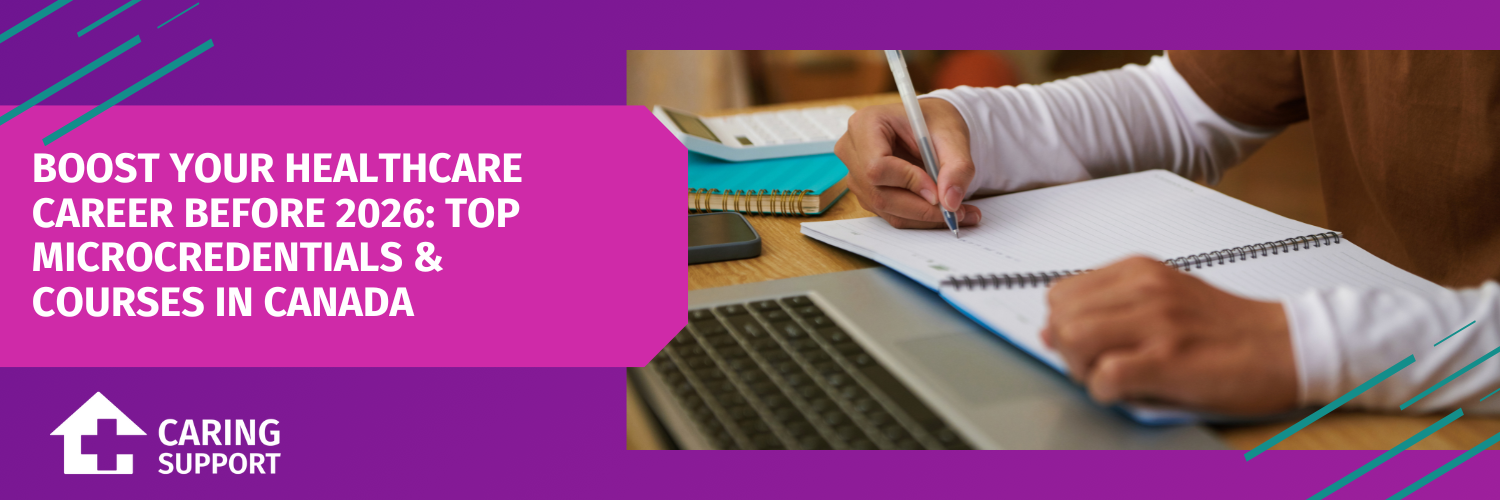
As the healthcare industry continues to evolve in Canada, professionals must stay ahead of trends, technology, and clinical best practices. Whether you are a personal support worker, nurse, or allied health professional, earning specialized microcredentials and completing relevant courses can significantly boost your career opportunities in 2025 and beyond.
Microcredentials are short, focused educational programs that provide practical skills and industry-recognized certifications. Unlike traditional degrees, these programs allow healthcare professionals to upskill quickly and tailor their learning to specific career goals.
In this article, we explore the top microcredentials and courses in Canada that can help healthcare professionals accelerate their careers before 2026. We’ll also highlight strategies for selecting the right program, tips for online learning, and how platforms like Caring Support can support your growth.
Healthcare employers in Canada increasingly value specialized skills over general qualifications. Microcredentials allow professionals to demonstrate proficiency in specific areas such as gerontology, dementia care, palliative care, or infection prevention. These short courses often come with practical, hands-on training, making graduates immediately applicable in the workplace.
According to Forbes, microcredentials are becoming a global standard for workforce readiness, particularly in high-demand sectors like healthcare. They provide measurable proof of expertise and make candidates more competitive in a crowded job market.
In Canada, healthcare professionals can earn microcredentials from universities, colleges, and specialized institutions, offering flexibility in both online and in-person formats.
For those starting as Personal Support Workers or looking to refresh their skills, a Healthcare Aide course in Canada provides essential training in patient care, hygiene, and mobility assistance. Microcredentials in this area are highly valued by long-term care facilities, hospitals, and community care organizations.
With an aging population in Canada, expertise in dementia and geriatric care is increasingly in demand. Microcredentials in dementia care, such as those offered by Caring Support Academy, help professionals gain specialized knowledge, from managing challenging behaviors to providing compassionate, patient-centered care.

Infection prevention and control remain top priorities in healthcare. Courses that provide certifications in this field, such as CPIC Infection Control Programs, ensure professionals can maintain safe environments, particularly in hospitals and long-term care facilities.
Palliative care microcredentials equip healthcare workers to provide high-quality care for patients with serious illnesses. These programs teach pain management, emotional support, and ethical decision-making, making graduates attractive hires for hospice organizations and hospital units.
Courses in advanced clinical procedures, such as phlebotomy, IV therapy, and medication administration, provide hands-on skills that enhance employability. Institutions like Canadian Nurses Association and local colleges offer microcredential programs aligned with provincial regulations.
When selecting a microcredential, consider the following:
Using resources like Caring Support for healthcare students helps identify programs that match your goals, offers guidance, and connects you with schools and institutions offering accredited certifications.
Online learning provides flexibility but requires self-discipline. Here are some strategies to maximize success:
Platforms like Caring Support allow students to track courses, earn digital badges, and create a portfolio to share with employers, giving learners a competitive advantage.
External sources like HealthcareCAN and Canadian Healthcare Network confirm that microcredentials are increasingly a key factor in hiring decisions.
Caring Support provides a centralized platform for healthcare students and professionals to:
By leveraging Caring Support’s microcredential resources, healthcare professionals can accelerate career growth, stay competitive, and be ready for opportunities in 2026 and beyond.
Microcredentials and specialized courses offer Canadian healthcare professionals a fast, effective way to advance their careers. Whether you’re a new graduate looking for essential certifications or a seasoned worker seeking to specialize in dementia care, palliative care, or clinical skills, these programs provide the knowledge and credentials employers demand.
By choosing the right course, staying disciplined in online learning, and leveraging platforms like Caring Support, healthcare professionals can ensure they are prepared for the growing opportunities and challenges in Canada’s healthcare industry.
A microcredential is a short, focused program that certifies skills in a specific area, such as dementia care, infection control, or clinical procedures.
Yes, programs accredited by Canadian institutions and recognized by professional bodies are valued by healthcare employers.
Most microcredentials can be completed in a few weeks to a few months, depending on the program and mode of study.
Yes, specialized certifications often lead to higher-paying roles, promotions, or specialized positions in healthcare.
Platforms like Caring Support and accredited colleges/universities provide up-to-date listings of recommended programs.

We'll keep you updated on all new application updates and features!